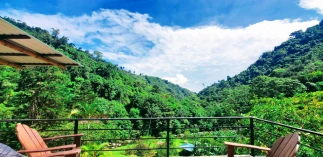Welcome back, birding enthusiasts at Hotel Rivel! As we continue our journey through the birds of Costa Rica, today we dive into the world of the Anhinga (Anhinga anhinga), also known as the Darter. This elegant waterbird is a common visitor to our country’s wetlands, rivers, and lakes, and you might just spot it stalking its prey from our very grounds!
Favorite Habitat
The Anhinga favors calm, shallow waters with abundant aquatic vegetation. Swamps, mangroves, meandering rivers, and lakes are its ideal stage. They nest in colonies with other large waterbirds, often reusing old nests built on trees or shrubs overhanging the water.
Male vs. Female: Contrasting Beauty
The male Anhinga is a stunning bird. Its iridescent blue-black plumage shimmers in the sunlight, with a striking white contrast on the wingtips and tail. Females, on the other hand, are less flashy. They sport dark brown plumage with white streaks on the neck and breast.
Silent Underwater Hunter
The Anhinga is a master of underwater hunting. Its streamlined body and long, snake-like neck allow it to swim stealthily underwater, leaving only its head and neck exposed. When it spots its prey, a small fish, it strikes with a sharp, dagger-like bill, resembling a harpoon.
Behavior and Characteristics
Unlike most waterbirds, the Anhinga has non-waterproof feathers. This makes it an excellent underwater swimmer but also means it struggles to take off from the water. To dry its feathers, it often perches on branches or logs with its wings spread wide in the sun, in a characteristic pose.
Anhingas are largely silent birds, but they may emit a loud hiss or a harsh croak during the breeding season. They are social birds and can be seen resting or hunting together in groups.
A Fascinating Neighbor at Hotel Rivel
Anhingas have been spotted around the wetlands near our hotel. If you keep your eyes peeled while exploring our trails or taking a boat in the area, you might be lucky enough to see this fascinating bird stalking its prey or drying itself in the sun!







